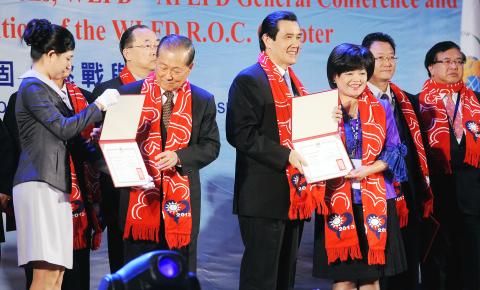President Ma Ying-jeou (馬英九) said on World Freedom Day yesterday that his administration hopes that dialogue between Taiwan and China can extend beyond economic and trade issues, to encompass human rights and the rule of law.
Taiwan’s ultimate goal is to maintain peace in East Asia and allow people on both sides of the Taiwan Strait to pursue the values of freedom and democracy, Ma said at a ceremony in Taipei marking 2013 World Freedom Day.
Ma said that since he took office in 2008, dialogue between Taiwan and China has focused on trade and cultural issues, but he expressed hope that the issues of freedom, democracy, human rights and the rule of law could be taken up in the near future.

Photo: Liu Hsin-de, Taipei Times
“Although democracy is an imported system, we have fully proved over the past 60 years that this foreign system can actually be cultivated in the soil of Chinese culture,” he said, adding that the Republic of China (ROC) has become a fully democratic country.
A sign of that, Ma said, is that Taiwan was again rated a free country in an annual report compiled by Freedom House, a Washington-based human rights advocacy group. Retaining its previous year’s rankings, Taiwan received a rating of “one” for political rights and a “two” for civil liberties, the group said in a press statement last week.
In the rankings, one represents the highest level of freedom and seven the least degree of freedom.
Ma also stressed that as a member of the international community, the ROC is determined to be a peacemaker, a provider of humanitarian aid, a promoter of cultural ties, a creator of new technologies and business opportunities, and a standard-bearer at the leading edge of Chinese culture.
“Without peace, freedom and democracy can hardly be achieved,” Ma said, adding that Taiwan and China have signed 18 agreements over the past five years, an indication of warming ties.
“I am not saying I’m happy with the ‘status quo,’ but at least both sides of the Taiwan Strait have found a peaceful solution to conflicts,” Ma said.
More than 400 guests from about 60 countries and territories attended the World Freedom Day celebrations, as well as the annual general conference of the World League for Freedom and Democracy and the Asian Pacific League for Freedom and Democracy.

Taiwan is stepping up plans to create self-sufficient supply chains for combat drones and increase foreign orders from the US to counter China’s numerical superiority, a defense official said on Saturday. Commenting on condition of anonymity, the official said the nation’s armed forces are in agreement with US Admiral Samuel Paparo’s assessment that Taiwan’s military must be prepared to turn the nation’s waters into a “hellscape” for the Chinese People’s Liberation Army (PLA). Paparo, the commander of the US Indo-Pacific Command, reiterated the concept during a Congressional hearing in Washington on Wednesday. He first coined the term in a security conference last

Prosecutors today declined to say who was questioned regarding alleged forgery on petitions to recall Democratic Progressive Party (DPP) legislators, after Chinese-language media earlier reported that members of the Chinese Nationalist Party (KMT) Youth League were brought in for questioning. The Ministry of Justice Investigation Bureau confirmed that two people had been questioned, but did not disclose any further information about the ongoing investigation. KMT Youth League members Lee Hsiao-liang (李孝亮) and Liu Szu-yin (劉思吟) — who are leading the effort to recall DPP caucus chief executive Rosalia Wu (吳思瑤) and Legislator Wu Pei-yi (吳沛憶) — both posted on Facebook saying: “I

Sung Chien-liang (宋建樑), who led efforts to recall Democratic Progressive Party (DPP) Legislator Lee Kun-cheng (李坤城), was released on bail of NT$80,000 today amid outcry over his decision to wear a Nazi armband to questioning the night before. Sung arrived at the New Taipei District Prosecutors’ Office for questioning in a recall petition forgery case last night wearing a red armband bearing a swastika, carrying a copy of Adolf Hitler’s Mein Kampf and giving a Nazi salute. Sung left the building at 1:15am without the armband and covering the book with his coat. Lee said today that this is a serious

A court has approved Kaohsiung prosecutors’ request that two people working for Democratic Progressive Party (DPP) Legislator Lin Dai-hua (林岱樺) be detained, as a probe into two cases allegedly involving her continues. The request was made on Friday, after prosecutors raided Lin’s two offices and the staffers’ residences, and questioned five on suspicion of contravening the Anti-Corruption Act (貪汙治罪條例). The people included the directors of Lin’s Daliao (大寮) and Linyuan (林園) district offices in Kaohsiung, surnamed Chou (周) and Lin (林) respectively, as well as three other staffers. The prosecutors’ move came after they interrogated Lin Dai-hua on Wednesday. She appeared solemn following